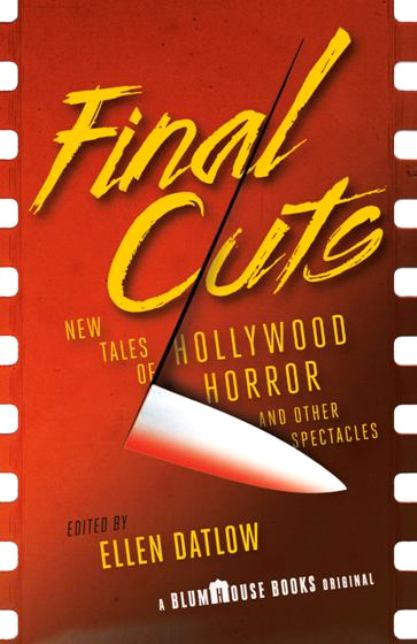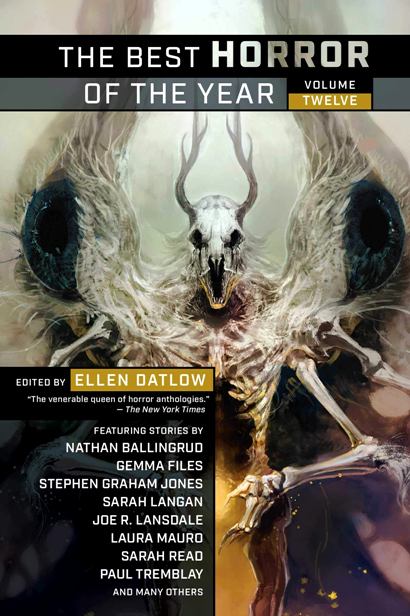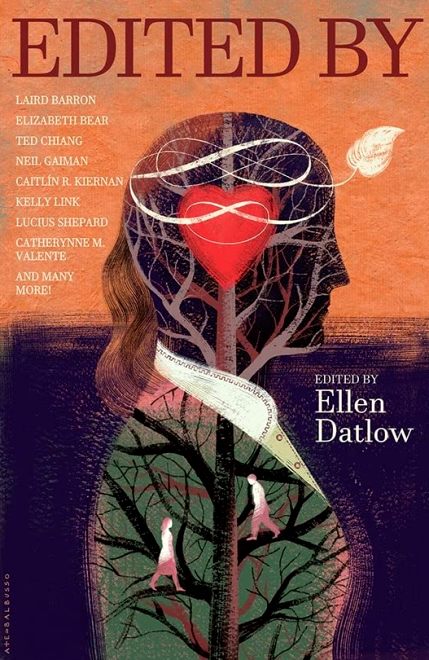

In this month's Special Page:
An exclusive new interview with Editor Extraordinaire Ellen Datlow
IN THE "SPECIAL PAGE" ARCHIVES:
Earl Hamner
Bentley Little
Simon Clark
John Russo
Mark Lukens
Joe R. Lansdale
Douglas Clegg
Interview with Ellen Datlow
by Jeani Rector
Q. I have personally always admired you, as you have reached heights that I only aspire to achieve. Where did you go to school, and when did you decide to become an editor? How did you break into the business?
A. I assume you mean college? I went to the State University at Albany, majored in English literature and minored in Philosophy. I knew nothing of publishing or editing until I graduated, traveled for a year all over Europe then came home and tried to figure out what to do with my life. I love reading so wanted to work with books. The options seemed to be librarian, work at a bookstore, or get into publishing. I was pretty clueless back then and basically sent my resume to every magazine and book publisher in the NY phone book. I heard back from Little, Brown, and Company. The main office was in Boston but they had a New York office. My first publishing job was sales secretary for the NY salesman. I knew I wanted to get into editorial and was an editorial assistant at several companies after that. Mainstream book publishing was very classist-if you didn’t attend an Ivy League school it was difficult to get anywhere. I was in book publishing getting nowhere slowly for about five years. OMNI was my first magazine job.
Q. You were the fiction editor of the prestigious Omni Magazine from 1981 through 1998. What was it like being part of such a popular, influential magazine?
A. It was terrific. We were paid pretty well, had expense accounts, and were able to pay authors (nonfiction and fiction) very well. Plus the magazine was beautifully designed. At the time we didn’t realize how influential it would be. It was and remains the only slick monthly that published science fact and science fiction. The look influenced several sf/f magazines. It was unique.
Q. You have edited aBest Horror of the Year (St. Martin’s Press and Nightshade Books) for many years now. How do you choose which stories to go into that? What do you look for as a yes, and what is specifically a no?
A. Here’s the process: I read hundreds of stories annually. I try to skim every genre magazine/webzine I’m aware of (I now have readers who read SF/F/mystery magazines that are unlikely to contain much horror); anthologies, single-author collections, and novella chapbooks.
When I finish reading an anthology, collection, or magazine I make a note about it — extensive or not. For stories I’m very impressed by, I put an asterisk on my recommended list (the latter compiles throughout the year as I read) as a note to reread toward the end of the process.
As with any story I’m reading for publication -original or reprint- I first notice voice, then an interesting plot, arresting images, and believable characters. Some stories provide a short, sharp, shock, others gain power upon rereading. And what I judge worthy to put in the Year's Best must have another element – not just one that causes discomfort, unease, terror, and occasionally, repulsion, but one that on a deeper level, stays with me and disturbs me and continues to disturb.
Generally, the story must have a resonance and must hold up over several readings because by the time I make my choices I have read each story I'm considering at least twice.
Q. You have won the Hugo Award for Best Professional Editor twice, and the Hugo for Best Short Form Editor six times, and once for best website.Your editing work has also been recognized with seven Bram Stoker Awards, ten World Fantasy Awards,two International Horror Guild Awards for Best Anthology, three Shirley Jackson Awards for Best Anthology, andfifteen Locus Awards for Best Editor. The British Fantasy Convention recognized you for “outstanding contribution to the genre.” In 2011,you were given the Life Achievement Award by the Horror Writers Association and in 2014you were given the Life Achievement Award by the World Fantasy Convention. You are the most recognized editor in the genre. Living in New York, are you recognized on the street?
A. Hahahahaha. Or course not. Oh maybe once, an sf/f/h fan came up to me and asked if I was Ellen Datlow. Editors are not celebrities. Even at sf/f/h conventions, there are plenty of attendees who don’t know what editors look like.
Q. Do you attend conventions? If so, what were your experiences?
A. I do. I regularly attend several a year (pre-covid)Worldcon, World Fantasy, Stokercon, Readercon, and sometimes Boskone and the International Conference of the Fantastic. I pay my own way to those. I’ll occasionally asked to be a Guest of Honor at a convention.
Q. Do you enjoy your career? What would you change, if anything?
A. I love it. Nothing.
Q. Have you ever published emerging (unknown) writers, only to have those same writers become best-sellers later on?
A. Sure. I’d say most editors have.
Q. Many people have defined the horror genre in many ways. How do you define it?
A. The simplest way I could define it is as the literature of dread.
Q. My pet peeves include the spelling of “alright” instead of “all right,” and “it’s” when they mean “its.” What specific words or phrases annoy you?
A. The misuse of “me” and “I” in sentences. And when the Oxford comma is left out before “and” in a series.
Q. Most of my readers are also writers. Can you give them tips as to how to better their final product before they submit?
A. Once you’ve finished a piece of work, let it sit for a few days. Then reread, edit, and proofread it. Sometimes reading your work aloud helps pinpoint problem areas or even silly errors/typos.

Ellen Datlow has been editing sf/f/h short fiction for four decades. She was fiction editor of OMNI Magazine and SCIFICTION and currently acquires short stories and novellas for Tor.com and Nightfire. She has edited numerous anthologies for adults, young adults, and children, including The Best Horror of the Year series and Echoes: The Saga Anthology of Ghost Stories, Final Cuts: New Tales of Hollywood Horror and Other Spectacles, and the reprint anthologies Edited By and Body Shocks. She’s won multiple Locus, Hugo, Stoker, International Horror Guild, Shirley Jackson, and World Fantasy Awards plus the 2012 Il Posto Nero Black Spot Award for Excellence as Best Foreign Editor. Datlow was named recipient of the 2007 Karl Edward Wagner Award, given at the British Fantasy Convention for "outstanding contribution to the genre" and was honored with the Life Achievement Award given by the Horror Writers Association, in acknowledgment of superior achievement over an entire career and honored with the World Fantasy Life Achievement Award at the 2014 World Fantasy Convention.
She runs the Fantastic Fiction at KGB reading series in the east village, NYC, with Matthew Kressel.
She can be found on twitter and facebook.


